
The Damascus goat is a breed of domestic goat that is mainly used for the production of milk, but it also has other uses. Depending on your definition of beauty, you could either think that this is the most beautiful goat, or the ugliest thing you have ever seen.
But, even if you don’t consider this animal a beauty, you will likely fall in love with its sweet, sad eyes. Today we are going to talk about everything you ever wanted to know about Damascus goats, including how to breed and raise them. Let’s get started.
Table of contents
- What are the Origins of the Damascus Goat?
- What are the Main Characteristics of the Damascus Goat?
- Physical Characteristics of the Damascus Goat
- What is the Damascus Goat Used For?
- Breeding Damascus Goats
- Raising Damascus Goats
- What Kind of Shelter do Damascus Goats Need?
- The Price of Damascus Goats by Region
- Damascus Goat – World Ugliest Animal
- Video: Short Video of Beautiful Damascus Goats
- FAQ’s
What are the Origins of the Damascus Goat?
This is an even-tempered animal that loves to get plenty of attention from humans, and in addition to being a great source of milk, it can also be a loving and fun pet.
The Damascus goat origin can be traced to India and other parts of the Middle East, but it didn’t originally come from this part of the world. It was originally exported by Britain in the 19th century, and brought to Cyprus where serious breeding began.
This is an even-tempered animal that loves to get plenty of attention from humans, and in addition to being a great source of milk, it can also be a loving and fun pet. It is calm and obedient, and if raised around them can be great with children. This is a large breed of goat, and they are happy to be left to their own devices in a pasture of medium size. Just make sure they have plenty of grass to graze on, and trees for shade. These animals do not forage well, as they have undershot jaws.
The Damascus goat is a hardy breed, and there are no known health issues within the breed. Anyone who is interested in raising goats should consider this breed, because they are so easy to care for. These are excellent starter goats.
These goats are generally bred and raised in Cyprus, Syria, and Lebanon, and they are known by many other names, including Baladi, Damascene, Shami, Halep, Aleppo, and Chami. Damascus Goats are native to the Middle East, and it is generally raised in large herds.
There are many stories in Arabic literature that mention the Damascus goat. It can be found in folklore in this region, and it is seen in religious literature as well. This is a noble beast, and it has often been used to create other breeds of goats, and there is plenty of interest in its genetics, as well as breeding. In 2008, a Damascus goat received the Most Beautiful Goat award at the Mazayen al-Maaz competition, held in Riyadh.
What are the Main Characteristics of the Damascus Goat?
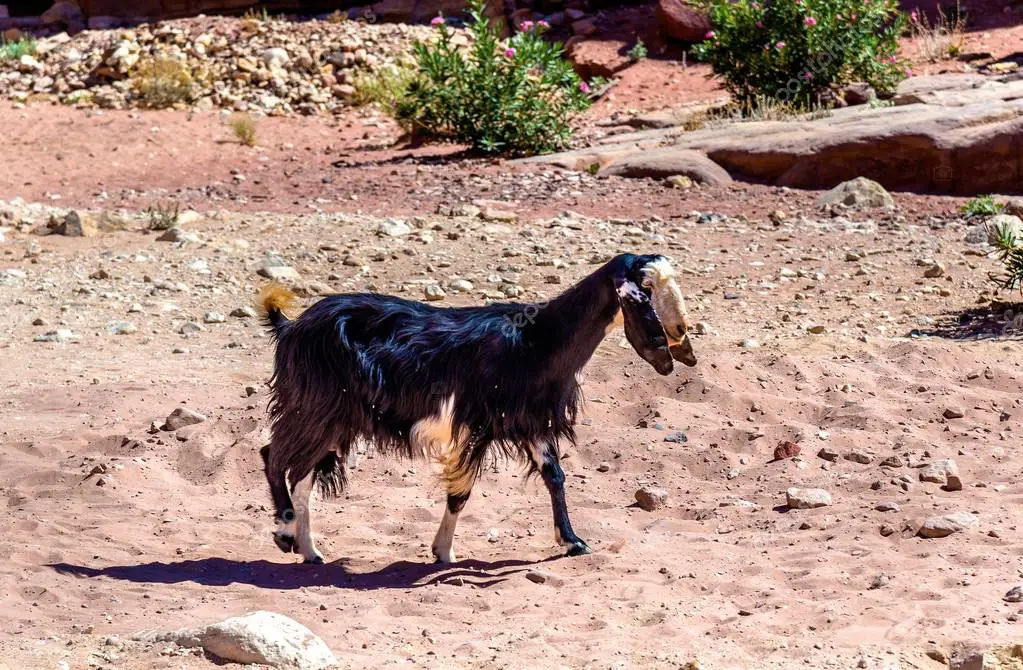
There are Damascus goat characteristics that make it completely different from any other type of goat breed. They are relatively large in size, and they are Nubian. Most Damascus goats are red or brown, but they are seen in other colors, including grey and pied. They can have horns or not, and they tend to have long hair. A fully grown Damascus goat has very long legs, and a long neck, but it has a small head. The bucks are larger than the does, which is normal among most goat breeds.
Physical Characteristics of the Damascus Goat
Damascus goats tend to weigh between 130 and 200 pounds, with the males being larger. An adult male will stand approximately 80cm at its withers. They have medium to longish hair, and it is very soft.
With jaws that are similarly structured like that of a bulldog, the Damascus goat isn’t exactly the prettiest animal in the world. They are adorable when they are small, but as their jaws grow, and with the snub nose, they don’t grow up to be gorgeous animals. Think of the saying, “a face only a mother could love” and you have the Damascus goat. But, those who love them really love them, and they see the inner beauty of the bred.
Generally, these goats are reddish brown in color, but there are many variations, including white, fawn, grey, and pied. These color variations can be found in both sexes. Damascus goats tend to weigh between 130 and 200 pounds, with the males being larger. An adult male will stand approximately 80cm at its withers. They have medium to longish hair, and it is very soft.
You might have noticed that these goats have very odd looking ears. Their ears are extremely long, and they tend to droop. Males and females have ears of the same length and style. The ears are often cropped for goats that are in shows.
Damascus goats have horns that are long and thick, and they curve backwards. The male has horns that are a bit longer than the female, but the shape is pretty much the same. These goats tend to reach maturity between 3 and 10 months.
Damascus Goat Skull
Damascus goats are known for their nearly square skulls. Their flat snouts and high nasal cavities give them one of the most unique appearances in the animal world. This appearance is highly prized in the Middle East. The most “attractive” specimens can sell for over $50,000 each!
Appearance
One cannot begin to discuss Damascus goat skulls without noting the unique appearance of the breed itself. The Damascus goat has a very distinctive profile, featuring a heavily convex or ‘roman nose’, droopy ears, and a narrow neck. Their skulls, when viewed in isolation, reflect this unusual architecture. The skull is elongated, with a pronounced convexity on the upper part. This distinct shape is a result of selective breeding to maintain and enhance these traits.
Significance in Breeding
The skull structure of the Damascus goat plays a significant role in breeding. Breeders often look for these distinctive features when selecting goats for reproduction. The more pronounced the traits, the more desirable the goat is considered to be. This selection process has driven the breed to its unique look, and it’s a process that continues today.
Cultural Significance
In some cultures, the skulls of Damascus goats are kept as talismans or used in traditional rituals. The distinctiveness of these skulls can make them symbolic and highly sought-after. This is in addition to their functional value in breeding and animal husbandry.
Scientific Interest
Beyond their cultural and functional value, Damascus goat skulls have also attracted scientific interest. Researchers in fields such as zoology, animal husbandry, and archaeology often study these skulls. They offer insights into the effects of selective breeding on animal morphology, and can provide information about past human societies and their relationships with animals.
Controversy and Animal Welfare
However, the breeding practices that lead to the distinct skull shape of the Damascus goat have also sparked some controversy. Some animal welfare organizations and individuals argue that the extreme breeding practices can lead to health problems in the animals, such as breathing difficulties. As such, there’s an ongoing debate about the balance between maintaining traditional breeding practices and ensuring the welfare of the animals.
The skulls of Damascus goats are truly fascinating. They are a testament to the power of selective breeding, cultural symbolism, and the complex relationship between humans and animals. Despite the controversy surrounding the breed, the interest in these unique animals and their skulls is likely to continue
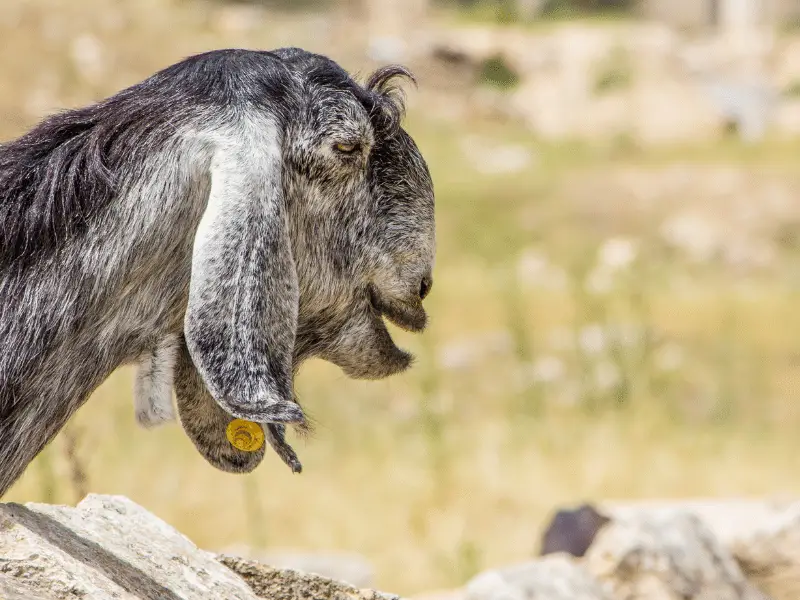
What is the Damascus Goat Used For?

In North America, goats are often kept as pets, including Damascus goats. But, there are several Damascus goat uses that farmers in other countries all over the world are taking advantage of. For instance, this is a dairy goat breed, and in most cases, it is used for milk production. At its peak, a single Damascus goat can produce as much as 650kg of milk in a single lactation.
But, these animals are highly valued for other reasons as well. They can be used for meat (as long as you don’t get too attached to them and decide to keep them as pets and for milk). They can also be used for making leather, and of course, since they are becoming more and more popular, Damascus goats are also used for breeding.
These goats grow quickly, and because of this, bucks are often cross-bred with regular goats. This helps them to become heavier faster. Damascus goats are known to have a high rate of twin births, and you can often get two to three babies per kidding. This is one of the reasons why these goats are so popular with goat breeders, as they can increase their goat count relatively quickly.
Breeding Damascus Goats

If there is anything that can be said about goat breeding, it’s that it is relatively simple; it is the same with Damascus goats. Keep in mind that these goats only breed once every year, usually in the spring time.
Damascus goat breeders who want to have large herds tend to have many of these goats, particularly if they are in the business of selling their animals. The breeding period is as long as 36 hours, with a breeding cycle of 18 to 24 days. The gestation period for these animals is about 155 days, and they usually have three to four kids at a time.
Damascus goats are excellent mothers, and they wean their kids so they don’t have to be bottle fed after leaving their mothers. Baby Damascus goats can drink their mothers’ milk for up to 240 days (the lactation period), and they tend to milk from four to six weeks. These animals have awesome maternal instincts, and they will do whatever it takes to protect their young.
Unless there are complications during pregnancy or delivery, there is little that the breeder needs to do in order to breed these animals. They pretty much take care of themselves, and they know how to look after their own babies without any human intervention. In fact, in most cases, natural breeding of these animals is the preferred method. A healthy buck can breed as many as 30 does, making him a pretty busy guy, and a popular one among the lady goats.
Raising Damascus Goats

If you are going to breed Damascus goats, it is important that you know how to raise these animals so they are healthy and happy. If an animal isn’t healthy, you aren’t going to get quality milk or meat from it.
Obviously, these goats need to be given quality food, and it needs to be nutritious in order for the goats to be healthy and active, as well as to be able to produce milk and more babies. If you are keeping these goats for milk, make sure that they are getting plenty of greens, which will help to improve milk production.
Believe it or not, these goats have more nutritional needs than human babies. It is important that you are using healthy goat feed for goats that have been weaned. Also keep in mind that if your doe has more than one baby, it has more nutritional needs than if it only has one.
Something else to consider when keeping Damascus goats is the care that is involved. Like any animal, these goats need to be vaccinated, and they will need to have de-worming medications regularly. If you have breeding bucks or pregnant or nursing does, it is important to give them even more care to ensure healthy babies.
What Kind of Shelter do Damascus Goats Need?
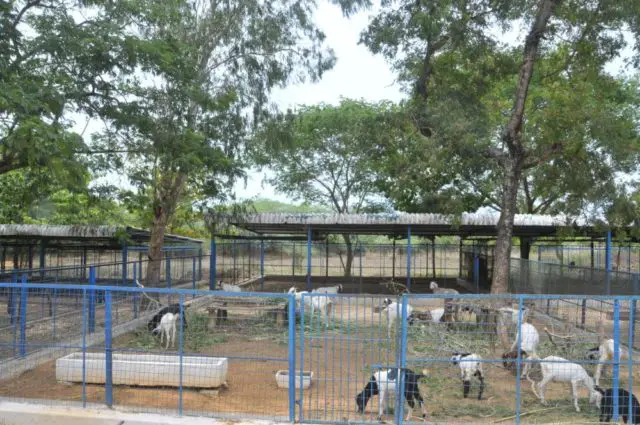
When it comes to a Damascus goat shelter, keep in mind that these goats are on the larger side, so they need plenty of space. A good rule of thumb to keep in mind is each goat should have approximately 15 square feet of space in their enclosure. They also require homes that are dry and clean, so make sure that you clean the enclosure regularly, and that there is always dry hay or straw. You will also need to make sure that there is good ventilation in their enclosures. The comfort of your animals is important for their overall health, and to ensure quality milk production.
Not only do they need dry space for comfort, this can also help to prevent infections. There are other things to consider as well when planning a shelter for a Damascus goat. For instance, in addition to their own space, you need to think about where and how you are going to store all of the supplies you need for raising these animals, including straw, food, water, and other goat-related supplies.
The Price of Damascus Goats by Region
The Damascus goat, also known as the Shami, Baladi, Halep, Allepo, Damascene or Chami, is a breed of goat that originates from the Middle East, particularly Syria. Its popularity has grown throughout the world due to its hardy nature and its ability to produce milk rich in fat and protein. The breed is also known for its unique appearance, often compared to a bulldog due to its similarly structured jaw. However, beyond its aesthetic appeal, the Damascus goat is a multipurpose goat breed, being raised for milk, meat, and hide production. Buying Damascus Goats varies widely based on geography:
Arabian Peninsula
On the Arabian Peninsula, the Damascus goat is immensely popular. It is particularly cherished for its beauty, and as a result, its price can exceed US$50,000, depending on its beauty score and your location on the Arabian Peninsula. This beauty score is a unique rating system, not typically applied to other goat breeds, and takes into account the physical appearance and condition of the goat.
United States
In the United States, the Damascus goat is considerably less expensive than on the Arabian Peninsula. The price of a Damascus goat in the United States ranges between $800.00 – $3,000.00. The lower price may reflect a lower demand for this breed, as it is not native to the region, and local farmers may prefer other breeds that are better suited to the local climate and farming practices.
Saudi Arabia
In Saudi Arabia, Damascus goats are sold by weight. As of June 2, 2023, the retail price range for live goats is between US$ 4.5 and US$ 6.5 per kilogram or between US$ 2.04 and US$ 2.95 per live weight pound (lb).
United Arab Emirates
In the United Arab Emirates, the retail price range for live goats as of June 2, 2023, is between US$ 5 and US$ 12 per kilogram or between US$ 2.27 and US$ 5.44 per live weight pound (lb).
Factors Influencing Price
The price of Damascus goats can vary significantly from country to country, and several factors influence these variations. These include:
- Demand: The popularity of the Damascus goat breed in a particular country can significantly influence its price. For example, in the Arabian Peninsula, where the breed is highly prized, the price can reach upwards of $50,000.
- Availability: The availability of Damascus goats in a country can also affect their price. Countries where the breed is common may have lower prices due to higher availability, while in countries where the breed is rare, prices may be higher.
- Beauty Score: The unique beauty score rating system applied to Damascus goats can significantly influence their price, particularly in the Arabian Peninsula, where this rating system is heavily valued.
- Farming Practices: The cost of raising and maintaining a Damascus goat can influence its selling price. Larger breeds, like the Damascus goat, require larger housing for rearing, which may increase the cost of farming and, subsequently, the selling price.
The price of Damascus goats varies greatly depending on the country and the factors mentioned above. Whether you’re a farmer looking to diversify your livestock or a collector in search of unique and exotic breeds, understanding these prices can provide valuable insights when purchasing a Damascus goat.
The price may be enough to turn you off wanting to raise Damascus goats, but you have to look at what you can earn in the long run. This is going to be an investment, and you can make a pretty good amount of money with your goats, whether you are breeding them to sell as live animals or you are selling the milk, meat, or leather. The reason why these animals are so costly is the fact that this is a rare breed.
Also, now that there are videos of these goats on social media, they are becoming increasingly popular, which is going to increase the price. If there is a market that really wants something, people will pay for it.
Damascus Goat – World Ugliest Animal
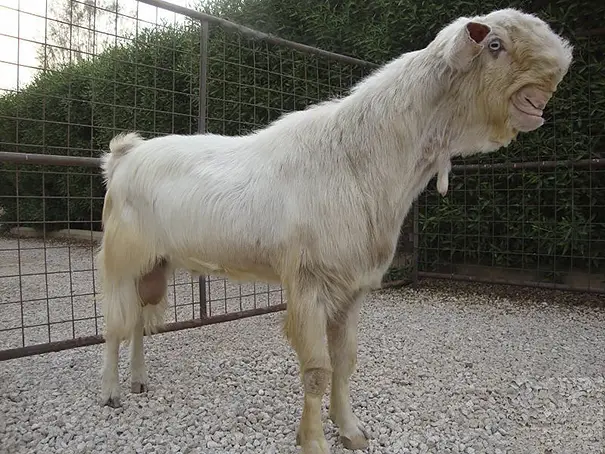
In 2018, a viral video surfaced that crowned the Damascus goat the “World’s Ugliest animal.” We don’t agree!
Video: Short Video of Beautiful Damascus Goats
This video shows beautiful Damascus Goats in a lovely setting.
FAQ’s
The Damascus goat, also known as Shami, is a breed of goat originating from the Middle East, specifically Syria and Lebanon. They are known for their long, drooping ears and distinctive facial structure, along with their high milk production.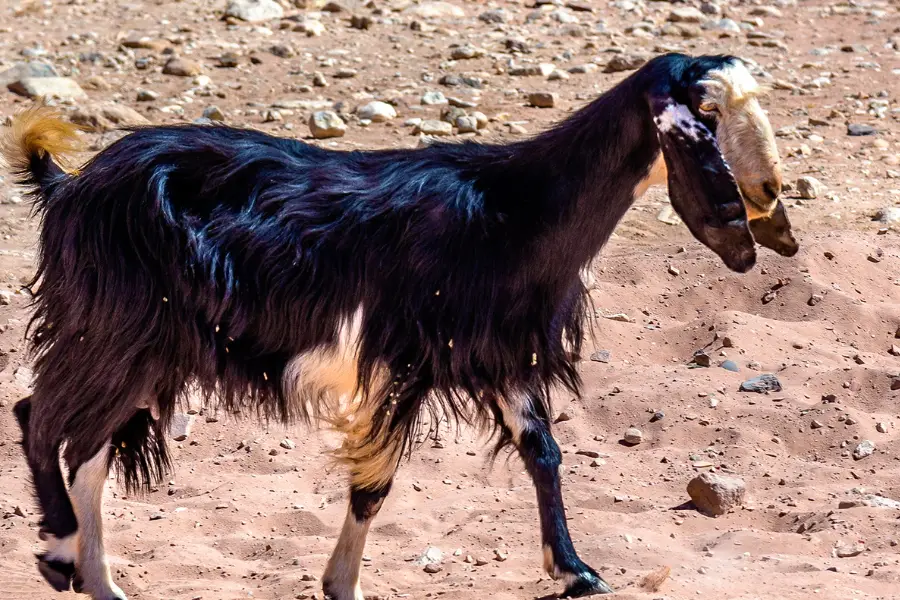
What are Damascus goats used for?
Damascus goats are primarily used for milk and meat production. Their milk is highly valued for its quality and is often used to produce cheese. Some individuals also raise them for their unique appearance or for breeding purposes.
Damascus goats are prolific milk producers. On average, a healthy adult doe can produce between 2 to 3 liters of milk per day during their lactation period, which usually lasts about 210 days. However, this can vary based on factors like diet, health, and age.
Like most goats, Damascus goats prefer a clean, dry environment with plenty of space to roam and graze. They can adapt to various climates but do best in warm, dry regions similar to their native habitat.
Damascus goats are ruminants and thrive on a diet of fresh forage, hay, and grains. They also require access to clean water and mineral supplements to stay healthy. It’s important to provide a balanced diet to ensure good health and productivity.
While Damascus goats are generally hardy and adaptable, they may not be the best choice for absolute beginners due to their high milk production and associated care needs. However, with adequate research and preparation, they can be a rewarding breed to raise.
The average lifespan of a Damascus goat is between 10 to 12 years, though some can live longer with proper care. Regular health check-ups and a balanced diet can contribute to a goat’s longevity.
Damascus goats can be purchased from breeders, livestock auctions, or through online marketplaces. It’s important to buy from reputable sources to ensure the health and genetic quality of the goats.
Never buy a goat that is less than six months of age, or that is still being bottle fed. Also make sure that it has been vet checked for good health.
You should buy at least two goats. Goats are social animals, and thrive when in the company other other goats. A single goat will be lonely and distressed.
Yes, a Damascus goat needs to have several vaccinations to stay healthy.


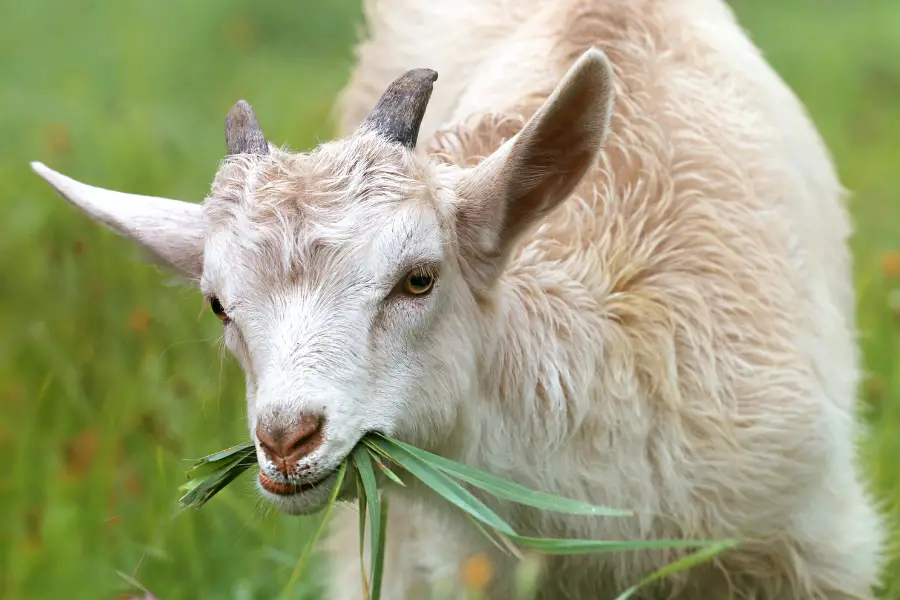
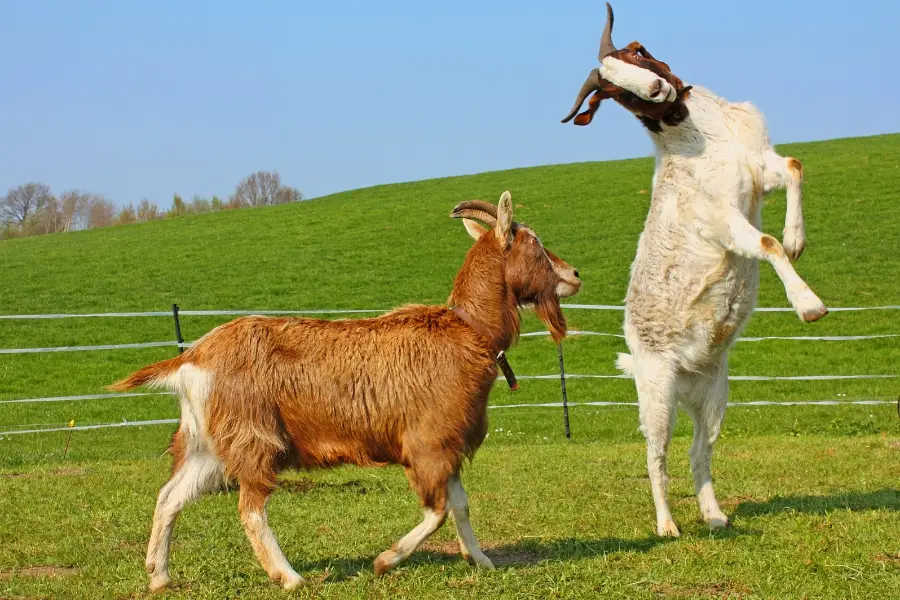
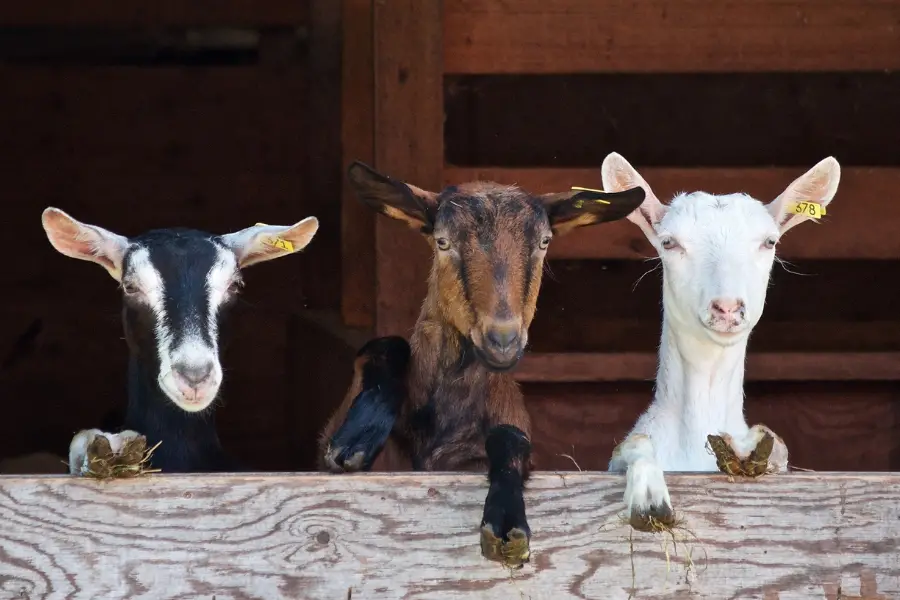
2 responses to “Raising Damascus Goats: The Ultimate Guide”
Raising Boer nice how much veraity goat and send your adress
Send your e mail